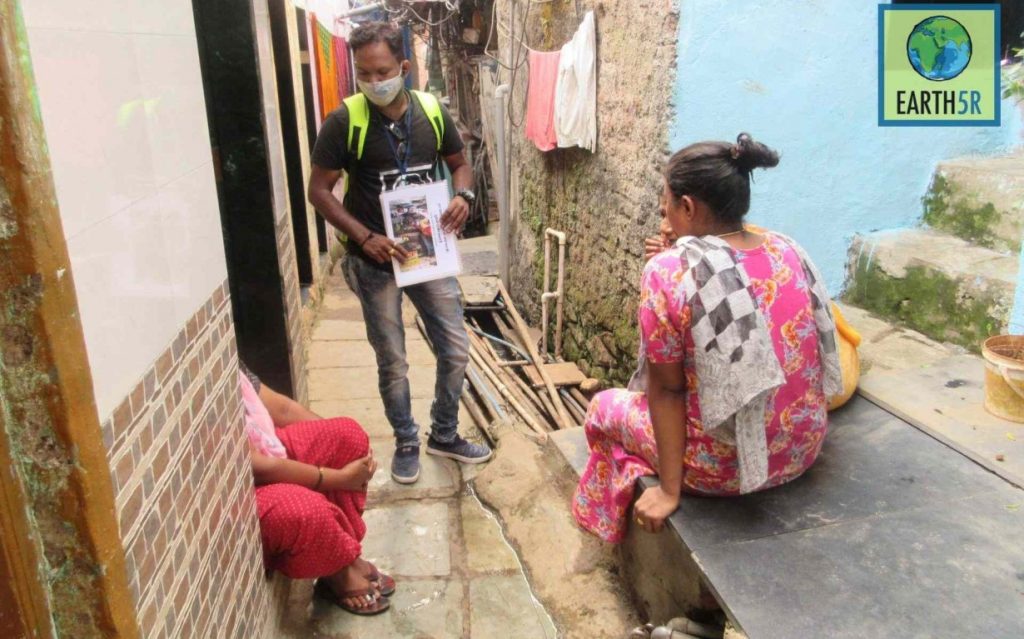
Solid Waste Management And Circular Economy Livelihood Programme In Mumbai: The Road To A Sustainable Community
Mumbai is marked with increasing population, rapid urbanization and economic growth.
With the total geographical area of 603 sq. Km., the city has an extremely high population density of 20,692 people per sq. Km.
Mumbai’s slums occupy 12 percent of its total geographic area.
17% of the world’s slum dwellers reside in India.
One such slum region is Kurla, a suburb in East Mumbai. It is marked with closely packed households having an average population of 4,00,000 diverse people making out their living.
Thirty Indians move from rural to urban areas every minute. (Source: NITI Aayog)
These people lack reliable sanitation services, safe drinking water, key infrastructure facilities, and a formal waste management system. This affects the overall environment of the people and the area, exposing them to various diseases and poor living quality.
In order to address the challenges of informal waste management and boost the local economy, the Earth5R team visits this region from time-to-time, to create awareness and community engagement under their Solid Waste Management and Circular Economy for Livelihood Training Programme.
In these hands-on training workshops, the main focus lies in bringing behavioural change among the slum dwellers towards solid waste management at household level and boost the local economy by using the concept of circular economy.
The volunteers engage the locals through interactive discussions, presentations, games, quizzes and take away the queries and local environmental concerns from the public. This helps them to build rapport them with and the audience also feels encouraged to share their views about local problems in their area.
UNDERSTANDING SOLID WASTE MANAGEMENT AT INDIVIDUAL LEVEL
The involvement of an individual person, family, neighbour, community and society as a whole plays a key role in an efficient and robust waste management system. This means that every small action matters and can create an impact towards the pressing problem of solid waste management.
For that matter, the Earth5R volunteers give door-to door training or collect a group of people to initiate a dialogue with them regarding the importance of ‘good practices’ for waste reduction at household level.
For instance, they give them valuable lessons in understanding the approach towards simple household actions that can help generate less waste and better health conditions. The key highlights of such a session involves segregation of waste at the primary source of generation by households into wet waste (kitchen waste), dry waste (recyclables and non-recyclable items) and hazardous waste, the 3R’s of waste management, importance of composting and its procedure, safe waste disposal practices, cleanliness and other eco-friendly practices.
‘WASTE TO WEALTH’ UNDER CIRCULAR ECONOMY FOR LIVELIHOOD PROGRAMME
Circular Economy is the concept in which the resources (in this case-plastics, old clothes, paper etc.) are kept in use for as long as possible, by extracting the maximum value from them and then recovering and regenerating products at the end of each service life. Overall this results in waste reduction, job skills, enhanced and sustainable local livelihoods.
By 2025, a trillion dollars in material cost savings could be generated from circular business models. (Source: Chintan-India Org)
Complementary to the awareness training about waste management, the citizen volunteers encourage the locals to not discard their waste mindlessly and instead suggest them to adopt practices such as upcycle, reuse of consumables or recycle of waste to transform it into some usable commodity which can be sold in the market.
This also empowers the local women and contributes towards income generation for the local economy. For example, the participants learn how to craft useful products out of waste plastic, paper and discarded clothes.
Circular economy offers a newer paradigm to address the growing challenge posed by the increasing amounts of waste generated.
Of the garbage being dumped, a considerable amount is removed by rag pickers who then sort it out and sell them to those who deal in recyclables like paper, plastics, metal, etc.
The impact of such training initiatives is massive as at least 100 families are getting trained per week and around 4,300 families have been trained in the past 50 days.
The dedicated citizen volunteers of Earth5R are truly making an impact at grassroot level, thereby driving towards a sustainable community and livelihood opportunities in Mumbai. This small movement to bring attention to the issue of a flawed waste management system and creating local livelihood opportunities truly shows that “Small Action = Big Impact!”.
ABOUT EARTH5R
Earth5R is an environmental organization from India with its head office at Mumbai. It works with the NGO sector, Companies and helps them conduct environmental Corporate Social Responsibility (CSR) programs across India.
Earth5R specializes in circular economy based projects. Earth5R also offers short term and long term environmental courses and fellowships.
-Reported by Trisha Garg, Edited by Riya Dani



